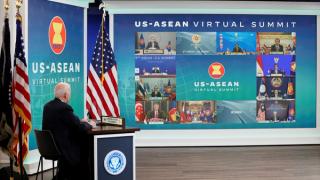A new report from the United States Studies Centre (USSC) cautions the United States needs to elevate the priority it gives to ties with the Association of Southeast Asian Nations (ASEAN) and other regional institutions if it is to compete effectively with China. In A seat at the table: The role of multilateral institutions in US Indo-Pacific Strategy, USSC Research Fellow in the Foreign Policy and Defence Program, Susannah Patton, argues Australia needs the United States to do more heavy lifting to counterbalance China.
Patton warns, “Compared to the Obama administration, the Biden administration’s efforts with ASEAN so far can only be described as modest, whereas China continues to step up its efforts, tipping the balance of influence among many regional players.”
Highlighting China’s successes with Sino-centric institutions and arrangements including the Lancang-Mekong Cooperation Forum, the Asian Infrastructure Investment Bank and Belt and Road Initiative, the report points to the potential for the United States to use regional forums more effectively to boost its own standing.
This shift in the region is critical for Australia. Patton notes, “For the past 30 years, Australia has seen regional multilateral institutions like ASEAN or the Asia-Pacific Economic Cooperation as ways make its own voice heard and entrench the United States in Asia, but growing US-China competition is straining these groups.”
The report asserts US involvement in the region comes with three compelling benefits for the United States: the opportunity to advance the administration’s own regional narrative and preferred norms; the need to prevent China from exclusively dominating regional groups; and the chance to focus administration resources and priorities towards the Indo-Pacific
“Xi Jinping hosting ASEAN leaders in November was a savvy move, especially because China typically only fields Premier Li Keqiang, but reports indicate President Biden may host ASEAN leaders for a summit in 2022. If this comes to pass, it bodes well for both US and Australian strategic goals.”
A seat at the table: The role of multilateral institutions in US Indo-Pacific Strategy is now available to read or download.
To book a briefing with USSC Foreign Policy and Defence experts, please email us at ussc.media@sydney.edu.au
Report recommendations
- The United States should continue to use the upcoming calendar of ASEAN, APEC and G20 meetings to drive focus, resources and official travel to Asia.
- President Biden should offer to host ASEAN leaders for a special summit to be held in the United States in 2022 to commemorate the 45th anniversary of dialogue partner relations.
- The United States should seek to upgrade its partnership with ASEAN to a Comprehensive Strategic Partnership by the next US-ASEAN summit, to be held in Cambodia in 2022.
- The United States should develop a new flagship initiative to be delivered in partnership with ASEAN, to be announced at the next US-ASEAN Summit.
- The United States should continue to invest heavily in the ASEAN Defence Ministers’ Meeting Plus.
- In developing its Indo-Pacific economic framework, the United States should avoid undermining existing relevant regional institutions, including the EAS and APEC.
- Washington should prioritise its relationship with Indonesia, given its current and future influence within ASEAN.
To book a briefing with USSC Foreign Policy and Defence experts, please email us at ussc.media@sydney.edu.au
Media enquiries
Mari Koeck
T +61 2 9114 2622
E ussc.media@sydney.edu.au





